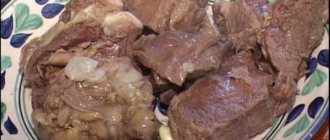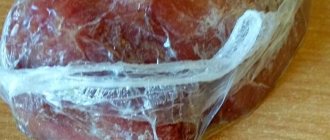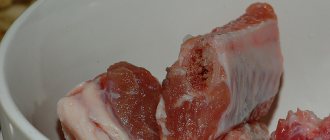To prepare healthy and tasty chops, cutlets, goulash, you need to use only fresh ingredients. But not every housewife knows how to understand that meat has spoiled and it is better to get rid of it. Sometimes after purchase they forget about it for several days, putting it in the refrigerator for just a couple of hours - until the evening, when more free time appears.
How can you tell if meat has gone bad?
The appearance and smell of the product will tell you about the condition. The edible fillet has a uniform color, without dark areas (bruises). The color depends on the type: lamb is dark, pork and rabbit are pink, veal has a delicate pink tint, beef is darker. The color of the bird is pale pink. The fillet is elastic, and when you press on it, the hole quickly recovers. The absence of mucus indicates suitability. The pulp does not have a pungent odor. When these signs are not detected, then most likely the section of the carcass or bird is spoiled.
During storage, it happens that the meat suffocates in the bag, and how to make it so that it does not smell is easy with the help of improvised means.
The dangers of eating expired meat
The product causes food poisoning of varying severity, accompanied by diarrhea, nausea, abdominal or muscle pain, and fever. Sellers, using folk techniques, can get rid of the smell of rotten meat, but its structure and color will give away the staleness. When purchasing a tenderloin, it is important to inspect it.
Ways to refresh flavorful meat are marinating and soaking. Available products - salt, sugar, vinegar, wine - effectively remove unpleasant aroma. For odor that appears due to lying for a long time, non-aggressive recipes based on chamomile decoction, soaking in juice or wine are suitable. In case of stench, the causes of which are poor-quality products (improper feeding or slaughter of livestock), stronger remedies are needed - vinegar, spicy spices, long-term marinating.
If the meat smells a little, what should I do? How to remove the smell of rotten meat? The meat suffocated in the bag, how can I stop it from smelling? – the answers to these questions are tricks using familiar products.
Please rate how useful this article was to you! ( 1 ratings, average: 5.00 out of 5)
Yandex recommends - the best articles on the site
You may also be interested in
- What are the different ways to cook meat?
- Types of meat roasting: 7 degrees and photo
- What are the best spices to use for meat?
- What are the categories of meat and meat products?
- 22 ways to get rid of the old smell in your apartment...
- What is mechanically separated poultry meat and can it be…
- How to properly thaw frozen meat at home...
- How long does frozen meat last in the freezer? Conditions and...
- How long can meat be stored in the refrigerator? Terms and conditions...
- Instructions: how to remove the smell of sweat from clothes under the arms in...
- What is marbled beef and how is it obtained?
- Instructions: how to remove the smell of rotten meat, mold and dampness from...
Get rid of the rotten meat smell in the refrigerator
Why does meat go rotten even when it is in the refrigerator? This occurs due to improper storage. The fact is that the plastic bag in which we usually place the carcass provokes the appearance of a strange aroma even before the product goes rotten. To get rid of the rotten smell of meat that has been stored in the refrigerator, there is a proven method.
Prepare:
- vinegar,
- soda,
- tea bags.
What to do:
- Defrost the refrigerator.
- Wash with detergent.
- Apply baking soda to a piece of cloth and wipe the areas where the rotten meat was.
- If the smell persists, clean the refrigerator with a vinegar solution.
- Ventilate the room and refrigerator.
- Place tea bags inside (they absorb odors) and turn on.
Why does meat have a smell?
The aroma of varying intensity may be due to improper feeding of livestock, slaughter or storage technology.
If the feed is of poor quality, the fillet will acquire a bad smell. The meat may be steamed, but it still has a flavor.
During slaughter, the animal experiences stress, which at the hormonal level affects the quality of the future product.
If the seller is dishonest in storing the product, the meat may become airy, saturated with the aroma of neighboring products, and if the optimal temperature in the refrigerator is not maintained, it may deteriorate. At home, improper storage also affects the quality of the pulp.
In addition to violations of storage conditions that led to spoilage, the consequences of other causes of odor are correctable.
If the meat smells a little, the question of how to fix it is relevant. This can be done by soaking or pickling. The procedure can be repeated if, after keeping it in the solution for some time, the scent does not go away.
How to eliminate unpleasant odors at home?
Meat that begins to emit an unpleasant odor should be processed immediately. If there are clearly damaged areas, it is better to cut them off and remove excess fat.
There are two main ways to remove flavor from meat:
- Soak.
- Pickling.
How to remove odor by soaking?
Soaking involves placing the meat in a solution for at least an hour. For this they traditionally use:
- wine;
- a low concentration aqueous solution of vinegar (per liter of water - 1 tbsp.);
- saline solution (per liter of water - 2 tbsp.);
- lemon or pomegranate juice.
The product that requires processing is completely immersed in the solution and left for an hour to several hours. This should be followed by a rinse to remove excess soaking solution.
Pickling
You can marinate meat according to several recipes. For these purposes, spices, salt and other ingredients are used. The simplest option is to rub the pulp with a mixture of salt and sugar. The meat remains in this form for 40-60 minutes, after which it is washed in water. If the smell still does not go away, proceed to preparing the marinade.
Most popular recipes:
- Coat the pulp with mustard and keep in a cool place for 1-2 hours.
- Rub the piece with spices (nutmeg, basil, black pepper, thyme, rosemary, etc.).
- Rub the meat with chopped garlic and chopped onion.
- Aging in soy sauce with added spices.
Using marinating not only eliminates odor, but also makes the product softer and juicier.
Features of removing amber for various types of meat
Different types of meat have their own characteristics in cooking and preparing the product for processing. For some species, a slight odor is natural and does not indicate spoilage.
Duck
Duck initially has a specific smell . To deal with it, soaking is used. You can use regular cold water. After this, the duck is wiped dry and rubbed with herbs. It is better to cook duck with spices that will overpower the aroma and make the dish delicious.
Beef
Beef lends itself well to marinating and soaking. You can start by soaking not too large pieces in a solution of vinegar and salt. After this, the meat is washed and, depending on the severity of the smell, marinated.
Chicken
In chicken, the main source of unpleasant odor can be fat . It is the first to start to deteriorate and smell bad. To solve the flavor issue, the fat is trimmed and the meat is marinated or soaked according to any recipe. Read more here.
Pork
Fresh pork does not have an unpleasant odor.
If there were no problems with storage, but the smell was unpleasant, most likely the meat of an uncastrated boar was put on sale . Such a product will have not just an unpleasant, but a stinking aroma that will persist even after cooking.
Deep freezing for several hours can partially eliminate it. If the smell remains, you can try soaking. Before this procedure, a large piece should be divided into thin slices, and fat should be cut off as much as possible.
For pork, a good option is to soak it in milk for 12 hours, changing the liquid every couple of hours. Additionally, you can use garlic.
Another option is to soak the meat in a salt solution with the addition of vinegar. For this processing you will need:
- 2 l. water;
- 4 tbsp. l. salt;
- 5 tbsp. l. vinegar.
The meat is soaked in the prepared solution for 6-10 hours. After this, a new one is prepared and soaking continues for another day.
To avoid buying boar meat out of ignorance, you can set fire to a piece of lard from a piece. If the smell turns out to be sharp and repulsive, it is better to refuse the purchase, since this is a boar.
This article will tell you how to remove the smell if the pork smells.
Mutton
Before cooking, excess fat is removed from the lamb, the flesh is rubbed with spices and placed in the refrigerator for several hours. Pickling can also be used. This article will tell you more.
Rabbit meat
Rabbit meat has a specific smell that is easily removed.
If the product is not spoiled, then simply soak the carcass in cold water overnight . After this, it is marinated to make it softer and more tender.
Lemon juice, wine, and kefir can be used as marinades. In addition, spices are added to the marinade.
The duration of marinating depends on the age of the rabbit. For a young person, 3 hours is enough, for an old person, up to 8 hours.
Goat meat
Goat meat is the most difficult meat to remove odors . Soaking in a vinegar solution for several hours and cooking with plenty of spices, including garlic, will help. Meat from an uncastrated goat cannot be processed and will have to be thrown away.
Game
The meat of elk, roe deer, beaver and other wild animals may have a specific smell, since the animal lives in its natural environment. The older the animal, the more pronounced the smell may be.
After cutting, individual pieces that will be eaten are soaked in salted water with the addition of vinegar, and rinsed in running water. It is better to cook game on the grill so that the smell of smoke permeates the meat.
Fish
Fish is a perishable product that should not be stored for a long time . If the location rules are violated, it will quickly become smelly. This is due to the structural features of the inhabitants of reservoirs.
The proteins found in fish are not stable and quickly begin to decompose, much faster than the proteins in meat. Fatty acids, which are part of fish products, also contribute to oxidative processes.
Stale fish is determined by the following signs:
- mucus and stickiness;
- strong repulsive aroma;
- the appearance of uncharacteristic spots;
- dull yellowed eyes;
- dark gills.
If these factors are present, such a product should not be consumed in food. For fresh fish that is not spoiled, but has a characteristic smell of a pond, recipes with marinating and adding spices can be used. Read more here.
How to remove bad odor from chicken
Before you get rid of the foul odor, you need to make sure the chicken is fresh and ready to eat. High-quality chicken pulp has a pink structure and a white tint to the fat layer.
To get rid of an unpleasant aroma, they resort to using simple and accessible techniques:
- You can “mask” the stench with chopped onions and garlic cloves. Peeled garlic is crushed in a garlic press, and the onion is grated. Rub the chicken with the prepared mixture and leave for 30 minutes in a cool room.
- If there is no time to soak the chicken, it is prepared using available means - salt and wheat flour. The two components are mixed and the mixture is rubbed onto the meat pieces. Flour absorbs unpleasant aroma, and salt cleanses the skin of the chicken carcass.
The “odor” is combated by marinating chicken. You need to take vegetable oil, wine or vinegar, add basil and place the product in this solution for 30 minutes. Wash with cold water and start cooking.
Choosing a quality product
To avoid purchasing a bad-smelling product, you should choose the right meat. Simple tips will help you with this:
- For fresh produce, go to the market: there you can touch, smell and examine the meat from all sides. Market sellers rarely resort to various frauds to improve their presentation.
- Color. Pork and veal are light pink, beef is red, and lamb is dark red. The main thing is that the shade is even.
- Smell. Be sure to smell the chosen piece. If you feel suspiciously musty, do not take the product; it may have already disappeared.
- Elasticity of fabrics. Press on the surface of the tenderloin or poultry carcass: if the quality of the product is good, the indentation will quickly go away.
- Hold the pulp in your hand: if your palm is dry and there is no mucus left on it, it means that this is a truly fresh product.
By learning to make the right choice, you will not bring home a spoiled product, and by mastering the methods of “reanimation”, you will be able to correct the problem.
Tweet
The smell of meat is quite common. What to do if the meat is smelly? What does smell mean? How to remove smell from meat? It appears in several cases:
- When the meat is rotten;
- Meat can suffocate in a plastic bag;
- Smells bad due to poor feeding;
- The smell of rotten meat is also characteristic if the animal was slaughtered incorrectly;
- Some varieties have an unpleasant aroma initially, and this is their distinguishing feature.
In some cases, the meat will have to be thrown away completely, and in some cases it can be rehabilitated and cooked without harm to health.
Fresh meat always has an even, uniform color
As mentioned above, some meats, such as knoor, lamb, pork and rabbit, have an unpleasant odor regardless of the degree of freshness.
Smoke problems
In order to get fragrant and tasty products at the end, it is recommended to evaluate the quality of the smoke. It can be light or heavy. If a long chimney is installed on the smokehouse, then all the heavy air settles on it. When the element is short, the heavy fractions do not have time to come out and settle on the surface of the products. Due to this, rancidity, acid, and other off-flavors occur.
On a note! The shorter the pipe installed in the smokehouse, the higher the likelihood of getting a spoiled dish.
How and why beef smells
Fresh raw beef has a weak and specific smell, boiled beef has a stronger smell and this aroma is most often very pleasant. It is more problematic to describe what fried beef smells like, since with this type of processing the natural odor is partially masked by aromatic seasonings. The same goes for ground beef with additives.
The older the animal, the more pronounced the smell. Another important point is that the meat of uncastrated males smells stronger than the meat of females. The meat of cattle, which is fed mostly with feed containing large amounts of protein, smells stronger. The use of certain veterinary drugs shortly before slaughter can also affect the smell of meat and fat.
Beef often develops odor during storage. When stored for a long time, beef may smell differently. The most common scenarios are:
- Slight damp smell - often found after defrosting;
- Rancid odor - This odor indicates oxidation of fat. You cannot eat such meat, even after heat treatment;
- Sour, unpleasant odor - meat is damaged by microorganisms. You cannot eat such meat, even after heat treatment.
- Old dry meat has its own aroma, which is difficult to confuse with something else. But frozen meat, normally, has no odor.
If the meat is smelly, can it be cooked and eaten?
Extraneous aromas that the pulp has absorbed from neighboring products, or received after long-term and improper storage, will not cause harm to health. Tricks for removing stench are varied and effective. When the meat smells sour or has become a little weathered, it can be eaten after processing, the main thing is that it is not spoiled. Personal aversion to such a product may play a role - not everyone is able to eat dishes knowing that the main component is of poor quality.











